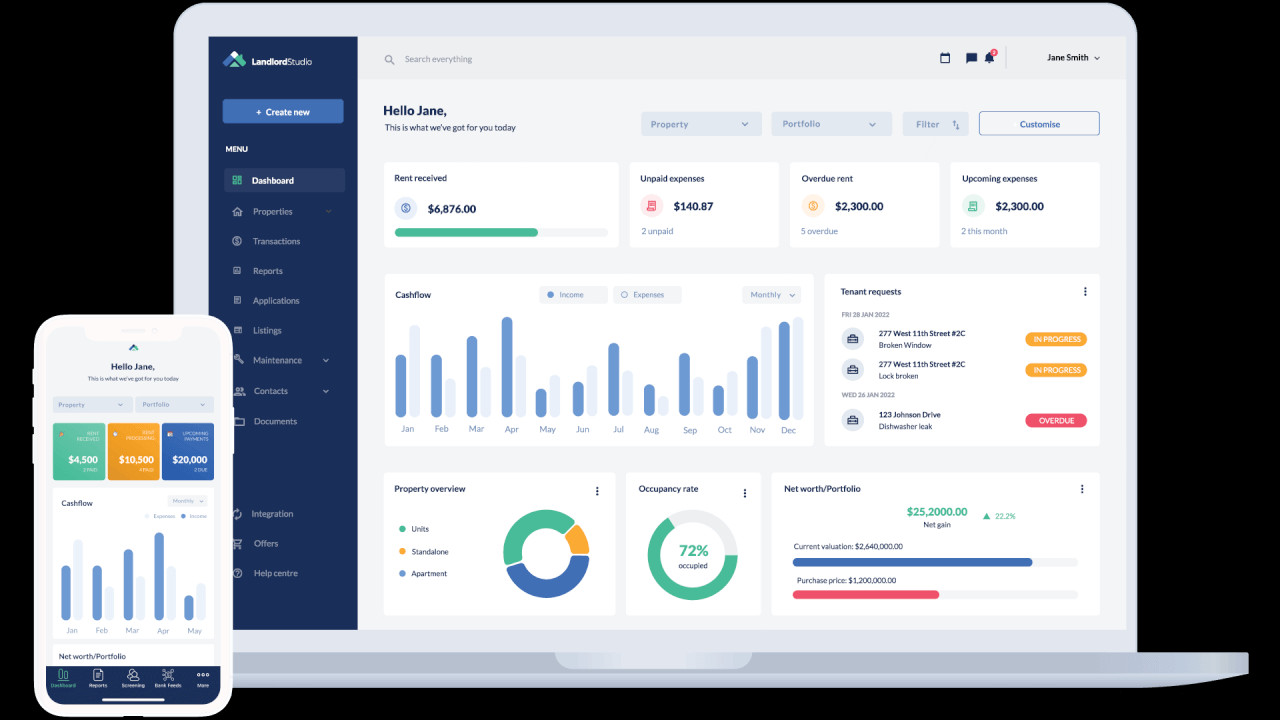How Much Income Tax On Rental Property do you really owe, and how can you potentially lower it? At income-partners.net, we provide you with the resources and connections to navigate the complexities of rental property taxes and enhance your income through strategic partnerships. Let’s explore tax strategies that may reduce your tax obligations. Discover ways to optimize your deductions, manage your financial records effectively, and identify potential partnership opportunities that can collectively benefit all parties involved.
1. Understanding Rental Income Tax: The Basics
What constitutes rental income, and how is it taxed? Rental income, as defined by the IRS, encompasses any payments received for the use or occupancy of a property. Generally, rental income is taxed as ordinary income at your standard income tax rates, unless you’re filing as a corporation like an LLC or S-Corp. These taxes might be owed at both the state and federal levels, except in states with no income tax. To understand your tax obligations, keeping accurate records of all income and deductible expenses is crucial.
1.1 What is Included in Rental Income?
Rental income isn’t just the rent you receive. It includes various forms of payments and compensations related to the property. Here’s a detailed list:
- Rent Payments: All rent received during the tax year.
- Advance Rent Payments: Any rent payments received in advance, regardless of the period they cover.
- Tenant Fees: Fees charged to tenants, such as late fees, pet fees, and early termination fees.
- Security Deposits: Non-refundable security deposits that you keep.
- Tenant-Paid Expenses: Expenses paid by tenants that should be covered by the landlord.
- Services in Lieu of Rent: Compensation received in the form of services performed by a tenant instead of rent payment.
1.2 Federal Income Tax Brackets
How do federal income tax brackets affect your rental income? In 2024, federal income tax brackets have been adjusted for inflation, and the standard deduction has increased, influencing how much you’ll pay. Your marginal tax bracket, ranging from 10% to 37%, depends on your filing status and taxable income.
Here are the 2024 federal income tax brackets:
| 2024 Tax Rate | Single Filers | Married Filing Jointly |
|---|---|---|
| 37% | $609,351+ | $731,201+ |
| 35% | $243,726 – $609,350 | $487,451 – $731,200 |
| 32% | $191,951 – $243,725 | $383,901 – $487,450 |
| 24% | $100,526 – $191,950 | $201,051 – $383,900 |
| 22% | $47,151 – $100,525 | $94,301 – $201,050 |
| 12% | $11,601 – $47,150 | $23,201 – $94,300 |
| 10% | Up to $11,600 | Up to $23,200 |
1.3 State Income Taxes
Are state income taxes relevant to rental income? Besides federal taxes, rental income may also be subject to state income taxes, depending on where the property is located. Some states, such as Texas, Florida, and Washington, do not have a state income tax, which can be a significant advantage for landlords.
Here’s a quick overview of states with no income tax:
- Alaska
- Florida
- Nevada
- New Hampshire
- South Dakota
- Tennessee
- Texas
- Washington
- Wyoming
1.4 Navigating Schedule E Form
The Schedule E form is a tax form utilized to report rental income, it is paramount to separate it from the W-2 income, what should I consider? Real estate investors generally file a Schedule E form, part of Form 1040, to report supplemental income and losses, including rental income and royalties. Ensure all rental-related income and deductible expenses are accurately reported on this form.
 Understanding IRS schedule e form 1040
Understanding IRS schedule e form 1040
2. Calculating Your Rental Income Tax
How do you calculate the income tax on your rental property? Calculating your rental income tax involves several steps. Here is the breakdown:
2.1 Total All Rental Income
Begin by summing up all rental income received during the tax year. This includes rent payments, advance rent, fees, and any other income sources related to the property.
2.2 Calculate Allowable Deductions
What expenses can you deduct from your rental income? Rental property owners can deduct various expenses to reduce their taxable income. Common deductions include mortgage interest, property taxes, insurance, maintenance, repairs, and depreciation.
Here’s a more detailed list of deductible expenses:
- Advertising and Marketing: Costs for advertising vacancies and marketing the property to potential tenants.
- HOA Dues: Homeowners Association fees.
- Insurance: Premiums for property, liability, and other relevant insurance policies.
- Leasing Commissions: Fees paid to leasing agents or brokers.
- Licenses and Permits: Costs for required licenses and permits to operate the rental property legally.
- Materials and Supplies: Expenses for materials and supplies used for maintenance and repairs.
- Mortgage Interest: Interest paid on the mortgage for the rental property.
- Professional Fees: Legal and accounting fees related to the rental property.
- Property Management Fees: Fees paid to a property management company.
- Property Tax: Real estate taxes paid on the rental property.
- Repairs and Maintenance: Costs for repairs and maintenance to keep the property in good condition.
- Travel: Expenses for travel related to managing the rental property.
- Utilities: Costs for utilities such as water, electricity, and gas, if paid by the landlord.
2.3 Determine Taxable Rental Income
What is considered taxable rental income? Subtract your total deductible expenses from your total rental income to calculate your taxable rental income.
Taxable Rental Income = Total Rental Income – Total Deductible Expenses
2.4 Apply Tax Bracket
Once you have determined your taxable rental income, apply the appropriate tax bracket based on your filing status and total taxable income to calculate the amount of income tax you owe on the rental property.
2.5 Comprehensive Example
To illustrate, consider a rental property with an annual rental income of $24,000 and total deductible expenses of $15,900.
- Total Annual Rental Income: $24,000
- Total Expenses: $15,900
- Taxable Rental Income: $24,000 – $15,900 = $8,100
In this scenario, the taxable rental income of $8,100 falls within the 10% tax bracket (up to $11,600 for single filers in 2024). Thus, the income tax owed on the rental property would be $810.
3. Tax Strategies for Rental Property Owners
What tax strategies can rental property owners leverage to minimize their tax liability? There are several effective tax strategies that rental property owners can use to reduce their tax obligations.
3.1 Maximizing Deductions
Are you taking advantage of all possible deductions? Maximize your deductions by keeping accurate records of all rental-related expenses. Deductible expenses include mortgage interest, property taxes, insurance, repairs, maintenance, and depreciation.
3.2 Depreciation
What is depreciation, and how can it reduce my tax bill? Depreciation allows you to deduct a portion of the property’s value each year over its useful life, which is typically 27.5 years for residential rental properties.
Depreciation = Property Value / 27.5 Years
Depreciation can significantly lower your taxable income.
3.3 Qualified Business Income (QBI) Deduction
Can you qualify for the QBI deduction? The QBI deduction allows self-employed and small business owners to deduct up to 20% of their business income from their taxes. To qualify, your total taxable income must be under certain thresholds, which vary based on your filing status. For example, for the 2023 tax year, the total taxable income must be under $364,200 for those married filing jointly, or $182,100 for single filers.
To qualify for the QBI deduction, the rental activities must be classified as business activities. Examples include property management, tenant screening, rent collection, and property maintenance.
3.4 Strategic Partnerships
How can partnerships benefit my rental income tax situation? Forming strategic partnerships can provide access to resources, expertise, and financial benefits that can help minimize your tax liability. For instance, partnering with real estate professionals or property management companies can help you optimize your rental operations and maximize deductions. Visit income-partners.net to explore potential partnership opportunities and connect with like-minded professionals.
3.5 Cost Segregation
Cost segregation is another advanced strategy that can accelerate depreciation deductions. By identifying and reclassifying certain property components as personal property rather than real property, you can depreciate these components over a shorter time frame, leading to larger deductions in the early years of ownership.
For example, items such as carpeting, specialized electrical systems, and certain types of flooring can be depreciated over 5, 7, or 15 years instead of the standard 27.5 years for residential rental properties.
3.6 1031 Exchange
A 1031 exchange, also known as a like-kind exchange, allows you to defer capital gains taxes when selling a rental property and reinvesting the proceeds into a similar property. This strategy can be particularly beneficial for investors looking to upgrade their portfolio without incurring immediate tax liabilities.
Requirements for a 1031 Exchange:
- Like-Kind Property: The replacement property must be of a similar nature or character as the relinquished property.
- Qualified Intermediary: A qualified intermediary must handle the exchange and hold the funds.
- Identification Period: You have 45 days from the sale of the relinquished property to identify potential replacement properties.
- Exchange Period: You have 180 days from the sale of the relinquished property to complete the purchase of the replacement property.
4. Common Rental Property Expenses to Deduct
What are some common rental property expenses that can be deducted? Landlords can deduct a wide range of expenses to lower their tax liability.
| Expense | Description |
|---|---|
| Mortgage Interest | Interest paid on your rental property mortgage. |
| Property Taxes | Real estate taxes paid on the rental property. |
| Insurance | Premiums for property, liability, and other relevant insurance policies. |
| Repairs | Costs for fixing damages or issues to maintain the property. |
| Maintenance | Costs for regular upkeep to prevent deterioration. |
| Property Management Fees | Fees paid to property management companies. |
| Advertising | Costs for advertising vacancies. |
| Legal and Professional Fees | Payments for legal and accounting services. |
| Depreciation | Deduction for wear and tear on the property over time. |
5. The Crucial Role of Record-Keeping
What role does record-keeping play in rental property tax management? Accurate and consistent record-keeping is essential for effectively managing your rental property taxes.
5.1 Tracking Income and Expenses
Why should you track your income and expenses throughout the year? Keeping real-time records of your income and expenses throughout the year can make tax preparation much easier. Using rental accounting software can streamline this process.
5.2 Software Solutions
How can software solutions help? Property management software such as Landlord Studio, as mentioned in the original article, can digitize receipts, categorize expenses, and provide real-time updates. Bank feed integration can further save time by automating data input.
5.3 Consistent Bookkeeping
Why is consistent bookkeeping so important? Consistent bookkeeping ensures that you accurately report all income and expenses, which can help prevent errors and potential audits. Even if you are not using property management software, a simple spreadsheet can be an effective tool for tracking your finances.
6. IRS Forms for Rental Income
What IRS forms are typically required for reporting rental income? When filing taxes for rental income, there are several key IRS forms you might need to complete.
6.1 Schedule E (Form 1040)
Schedule E (Form 1040) is the primary form for reporting rental income and expenses. On this form, you’ll list all rental income received and deduct all eligible expenses.
6.2 Schedule A (Form 1040)
Schedule A (Form 1040) is used for itemizing deductions, including certain personal expenses related to your rental property.
6.3 Form 4562
Form 4562 is used to report depreciation and amortization. This form allows you to deduct the depreciation of your rental property and any improvements you’ve made.
6.4 Form 8960
Form 8960 is used to calculate the Net Investment Income Tax (NIIT). If your net investment income exceeds certain thresholds, you’ll need to file this form.
6.5 Form 1099-NEC
Form 1099-NEC is used to report payments made to contractors. If you paid any contractors more than $600 during the tax year, you must file this form.
7. Avoiding Common Mistakes
What are some common mistakes to avoid when filing taxes for rental property? Navigating rental property taxes can be complex, and it’s easy to make mistakes if you’re not careful.
7.1 Not Reporting All Income
Why is it important to report all rental income? Failing to report all rental income is a common mistake that can lead to penalties. Make sure to include all rent payments, fees, and other income sources.
7.2 Overlooking Deductions
Are you missing out on potential deductions? Overlooking eligible deductions is another common mistake. Review all potential deductions, such as mortgage interest, property taxes, and repairs, to minimize your tax liability.
7.3 Inaccurate Record-Keeping
Why does accurate record-keeping matter? Inaccurate record-keeping can lead to errors and potential audits. Maintain detailed and organized records of all income and expenses.
7.4 Mixing Personal and Rental Expenses
Why should you keep personal and rental expenses separate? Mixing personal and rental expenses can complicate your tax return and make it difficult to justify deductions. Keep separate accounts and records for your rental property.
7.5 Ignoring Depreciation
Why is it important to understand depreciation? Ignoring depreciation can result in a higher tax bill. Understand how depreciation works and claim it accurately on your tax return.
8. The Future of Rental Income Taxation
How might future tax laws affect rental property owners? The tax landscape is constantly evolving, and it’s essential to stay informed about potential changes that could impact rental income taxation.
8.1 Tax Cuts and Jobs Act (TCJA)
What provisions of the TCJA are set to expire? Several provisions from the Tax Cuts and Jobs Act (TCJA) of 2017 are scheduled to expire in 2025, which could significantly alter the tax landscape for rental property owners. These changes may affect tax rates, deductions, and credits.
8.2 Potential Legislative Changes
What legislative changes could impact rental income taxes? Future legislative changes could also impact rental income taxes. Staying informed about proposed tax reforms and understanding how they could affect your tax liability is crucial.
8.3 Expert Advice
Why should you seek expert advice? Given the complexities of tax laws and the potential for future changes, seeking advice from a qualified tax professional or CPA is always a good idea. A tax expert can help you navigate the intricacies of rental income taxation and develop strategies to minimize your tax liability.
9. Exploring Partnership Opportunities
What partnership opportunities are available for rental property owners? Exploring partnership opportunities can bring new dimensions to your rental property business, offering benefits like expanded resources, shared expertise, and reduced risk.
9.1 Types of Partnerships
What types of partnerships should you consider? Several types of partnerships can be beneficial for rental property owners, including strategic alliances, joint ventures, and co-ownership agreements.
9.2 Benefits of Partnerships
What are the benefits of forming partnerships? Forming partnerships can provide numerous benefits, such as increased access to capital, shared management responsibilities, and diversified investment portfolios.
9.3 Finding Partners
How can you find potential partners? Finding the right partners requires careful consideration and due diligence. Networking events, industry conferences, and online platforms like income-partners.net can help you connect with potential partners who share your goals and values.
Address: 1 University Station, Austin, TX 78712, United States
Phone: +1 (512) 471-3434
Website: income-partners.net
 Partner success story
Partner success story
10. Frequently Asked Questions (FAQs)
10.1 Is rental income considered earned income?
No, rental income is generally considered passive income rather than earned income.
10.2 What is the standard deduction for rental property owners?
The standard deduction varies based on filing status. Refer to the IRS guidelines for the most up-to-date information.
10.3 Can I deduct the cost of improvements to my rental property?
Yes, but improvements are typically depreciated over time rather than deducted in a single year.
10.4 How do I report rental income on my tax return?
You report rental income on Schedule E (Form 1040), which you file with your individual income tax return.
10.5 What is the QBI deduction for rental property owners?
The QBI deduction allows eligible self-employed and small business owners to deduct up to 20% of their qualified business income.
10.6 Can I deduct travel expenses related to my rental property?
Yes, you can deduct travel expenses that are ordinary and necessary for the management, conservation, or maintenance of your rental property.
10.7 What happens if I sell my rental property?
When you sell your rental property, you may be subject to capital gains taxes. Consult with a tax professional to understand the tax implications.
10.8 How does depreciation affect my rental income taxes?
Depreciation reduces your taxable income by allowing you to deduct a portion of the property’s value each year over its useful life.
10.9 What records should I keep for my rental property?
You should keep records of all income, expenses, receipts, invoices, and other relevant documents related to your rental property.
10.10 Where can I find more information about rental income taxes?
You can find more information on the IRS website, in IRS publications, and by consulting with a qualified tax professional.
Understanding how much income tax you owe on rental property and how to minimize it is crucial for maximizing your investment returns. By leveraging deductions, strategic partnerships, and accurate record-keeping, you can navigate the complexities of rental income taxation effectively. Visit income-partners.net to explore opportunities, connect with potential partners, and enhance your rental property business. Discover strategies for building strong relationships, negotiating favorable terms, and achieving long-term success. Don’t miss out on the chance to transform your rental property investments and unlock new levels of profitability.
